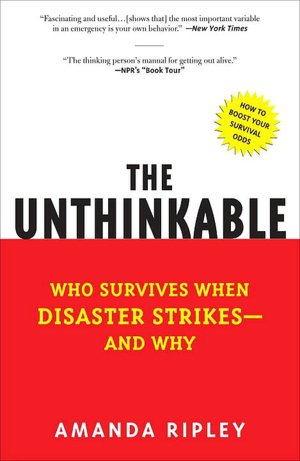 Ripley weaves survivor tales, scientific study, government policy, and more into a powerful narrative that provides amazing insight and life saving perspective into our understanding of disaster and how we respond to it. She also tells us that we can improve our responses. Something so simple as actually reading those emergency cards on all airplanes and choosing an exit to use if needed can make the difference between surviving a crash and not.
Ripley weaves survivor tales, scientific study, government policy, and more into a powerful narrative that provides amazing insight and life saving perspective into our understanding of disaster and how we respond to it. She also tells us that we can improve our responses. Something so simple as actually reading those emergency cards on all airplanes and choosing an exit to use if needed can make the difference between surviving a crash and not.From survivor stories and scientific research, we are learning how our brains function in a disaster. When something unexpected and threatening happens, most of us either do the wrong thing or do nothing at all. Restaurant patrons finish dinner while the room they are dining in fills with smoke. Airline passengers laugh when a flight attendant calls, "brace, brace." People who should be evacuating their offices take time to turn off computers, search for the book they are reading, or make a phone call.
Some people even make up stories about what is happening – and believe them. In a large scale disaster, victims often think it is happening only to them. People exiting the Twin Towers expected to find activity on the street going on as usual. They were shocked by what they actually confronted.
And, little things can make a big
difference. For example, more women were
injured escaping from the Twin Towers than men because their shoes were a
serious hindrance and had to be discarded.
Several survivors reported that they had to skirt piles of women's shoes
in the stair wells as they descended from upper floors. In a disaster, something relatively insignificant
can become an enormous obstacle.
For all that, this is a surprisingly hopeful
book. Any of us can be caught in a
disaster at any time and those of us involved are the true first responders. With a little luck, a little information, and
a little planning, we can save ourselves and possibly others.
We can't do much about the luck, but we can do
a good deal about the information.
Something so simple as actually reading those emergency cards on all
airplanes and choosing an exit to use if needed can make the difference between
surviving a crash and not.
Ripley outlines some basic steps we can all
take to improve our chances of surviving and some web sites we can visit for
more information. Some of the steps are
basic and easy. Others are more far
reaching and complex.
She even offers a few good suggestions to help
you decide what you should be worrying about.
So, what disasters worry you? Have you made any preparations? Let us know!

